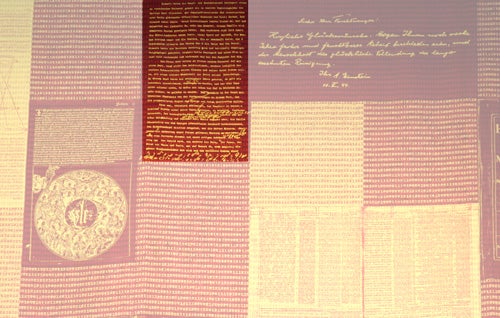
Feuchtwanger working on a manuscript, circa 1950. Photograph by Florence Homolka.
John Nava's "The Trojan Family Tapestry" was recently unveiled in the new Ronald Tutor Campus Center. The tapestry features several texts from the USC Libraries' Special Collections holdings. This post is the first installment in a series exploring those texts.
Located at the top of the tapestry, and roughly in the middle horizontally, is a manuscript of Lion Feuchtwanger's 1925 novel Jud Süß. The novel, which condemned antisemitism, propelled the author to international literary fame upon publication.
The text comes from the Feuchtwanger Memorial Library, created when Marta Feuchtwanger donated her late husband's papers and book collection to USC. With its handwritten marginal notes, the Jud Süß manuscript represents the wealth of information about Feuchtwanger and his works contained within the USC Libraries' holdings—information that scholars from around the world travel to USC to access.
Feuchtwanger based the novel on the life of Joseph Süß Oppenheimer, a Jewish-German businessman who rose to prominence as a financial advisor to the duke of Württemberg. In the novel, Süß discovers that he is actually not Jewish but the illegitimate son of a nobleman. Nonetheless, he continues to live as a Jew. Eventually, his success breeds jealously among his rivals, and he is arrested and sentenced to die. His last chance at a reprieve is to convert to Christianity, but Süß refuses, and dies reciting the Sh'ma Yisrael, a Hebrew prayer.
In a biographical sketch on Feuchtwanger, USC German professor Harold von Hofe wrote about the novel's impact on the author's career:
The name Feuchtwanger had become a literary by-word by 1926-1927 in England and America when his first major novel, Jud Süß, was brought out as Jew Suess by Martin Secker in London, and as Power by the Viking Press in New York. The stern London critic Arnold Bennett characterized the story about the eighteenth century Jewish courtier Joseph Süss Oppenheimer as a novel that enthralled while it broadened knowledge. The Londoner reported April 1,1927 that Jew Suess ran away with the season's plums. For the American critic Clifton Fadiman it was a historical novel of epical dimensions. Matthew Josephson wrote in the New York Herald Book Review that Feuchtwanger won an honored place among the foremost writers of Europe, for his novel was executed upon the large romantic canvas of a Dumas, filled with the cruel human details of a Tom Jones, and resembled in plan Stendhal's La Chartreuse de Parme and Le Rouge et le Noir.
The photographs below show the text's location on the tapestry.

